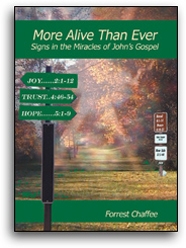SermonStudio
Peace Is Like A Flowing River
Biblical Studies
More Alive Than Ever
Signs In The Miracles Of John's Gospel
When evening came, his disciples went down to the sea, got into a boat, and started across the sea to Capernaum. It was now dark, and Jesus had not yet come to them. The sea became rough because a strong wind was blowing. When they had rowed about three or four miles, they saw Jesus walking on the sea and coming near the boat, and they were terrified. But he said to them, "It is I; do not be afraid." Then they wanted to take him into the boat, and immediately the boat reached the land toward which they were going.
In his will is our peace.
-- Dante
In his will is our peace.
-- Dante


